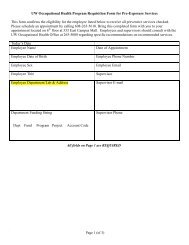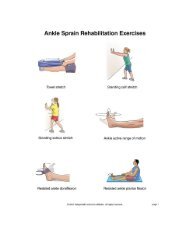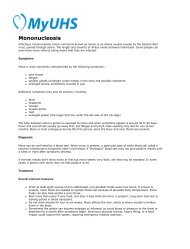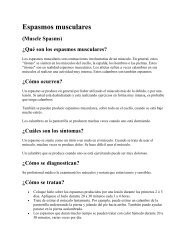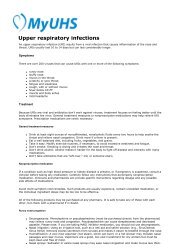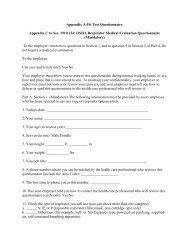Irritable bowel syndrome
Irritable bowel syndrome
Irritable bowel syndrome
Create successful ePaper yourself
Turn your PDF publications into a flip-book with our unique Google optimized e-Paper software.
<strong>Irritable</strong> <strong>bowel</strong> <strong>syndrome</strong><br />
<strong>Irritable</strong> <strong>bowel</strong> <strong>syndrome</strong> (IBS) is a disorder that affects the large intestine (colon). It is more common in<br />
women than men and often starts around age 20. IBS can be painful but does not permanently harm the<br />
intestines, cause intestinal bleeding, or lead to serious health conditions or diseases.<br />
Symptoms<br />
IBS is usually characterized by abdominal pain and discomfort that is often accompanied by constipation and/<br />
or diarrhea. Other symptoms include:<br />
●<br />
●<br />
●<br />
●<br />
●<br />
●<br />
●<br />
cramping pain in the abdomen<br />
swollen or bloated abdomen<br />
mucus in the stool<br />
the feeling that a <strong>bowel</strong> movement is not finished<br />
a sense of urgency to have a <strong>bowel</strong> movement<br />
relief of symptoms after a <strong>bowel</strong> movement<br />
worsening of symptoms during the menstrual period<br />
Causes<br />
IBS has no known single cause. Research indicates that those with IBS have a colon that is more sensitive and<br />
reacts more to a variety of things, including certain foods and stress, though the cause of this sensitivity<br />
remains unclear. The IBS symptoms themselves result from changes in the normal motion of the colon; it may<br />
either be too fast, which leads to diarrhea, or too slow, which leads to constipation. It may also spasm, which<br />
causes strong muscle contractions and cramping.<br />
Diagnosis<br />
IBS is diagnosed based on a complete medical history, including a description of symptoms and a physical<br />
exam. Diagnostic tests may be used to rule out other problems, but testing is not necessary to diagnose IBS.<br />
Treatment<br />
Because there is no cure for IBS, treatment is aimed at alleviating symptoms. Sometimes medication may be<br />
prescribed by a clinician.<br />
General treatment measures<br />
Stress management: Stress can trigger symptoms of IBS. Managing stress can improve the functioning of<br />
the GI tract’s nervous system and is an important part of treatment. Research shows that cognitive behavioral<br />
therapy may be particularly helpful in managing stress. Other options for managing stress include:<br />
●<br />
●<br />
●<br />
Try to sleep at least 6 to 8 hours a night.<br />
Exercise regularly.<br />
Meditate or practice yoga daily.<br />
Diet changes: Some foods, such as fatty foods, foods high in fructose, or dairy products, may worsen IBS<br />
symptoms. If certain foods cause symptoms, eat less of them or avoid them completely. Keep a list of<br />
troublesome foods in a journal and discuss them with a clinician or dietitian.<br />
Try some of the following dietary changes to help alleviate IBS symptoms:<br />
●<br />
●<br />
●<br />
●<br />
●<br />
Avoid carbonated beverages, which can produce gas and cause discomfort.<br />
Drink six to eight glasses of water a day to treat constipation.<br />
Avoid chewing gum and eating quickly, both of which can lead to swallowing air, which produces gas.<br />
Eat smaller meals more often or smaller portions since large meals can cause cramping and diarrhea.<br />
Include high-fiber foods such as whole grains, beans, fruits, and vegetables in the diet, which may
educe constipation and prevent spasms. To minimize gas and bloating, increase fiber intake slowly by<br />
two to three grams daily.<br />
Nonprescription medications<br />
Peppermint oil<br />
Peppermint oil contains menthol, a chemical that relaxes smooth muscles in the GI tract. Research studies<br />
show that peppermint oil may be effective in reducing the amount of cramping and pain with IBS.<br />
A common dose is 200 mg twice a day. Enteric-coated capsules are recommended since they dissolve lower in<br />
the GI tract, which means that they are less likely to cause heartburn or other reflux-related discomfort.<br />
Fiber supplements<br />
Fiber supplements have been commonly used to manage IBS symptoms, but recent studies have shown that<br />
they may not be as helpful as they seem. Taking fiber supplements increases the risk of gas and bloating.<br />
Laxatives<br />
Constipation that does not get better with lifestyle changes can be cautiously managed by the use of laxatives.<br />
These include stool softeners (docusate), colonic stimulants (bisacodyl, senna), and osmotic agents<br />
(polyethylene glycol, magnesium-containing compounds, lactulose). Polyethylene glycol and magnesium-based<br />
agents are safe, well-tolerated and can be used long-term.<br />
Stool softeners may be useful when taken along with other treatments, although none of them will help with<br />
the cramps associated with IBS.<br />
Anti-diarrheal drugs and others<br />
●<br />
●<br />
●<br />
Loperamide hydrochloride (Imodium): take 2 to 4 mg every morning. This can be increased or<br />
repeated if necessary, but do not exceed 8 pills daily.<br />
Beano: an enzyme available in either pill or liquid form that helps reduce gas by breaking down<br />
indigestible carbohydrates such as those found in beans, cauliflower, and broccoli. Follow label<br />
directions.<br />
Lactaid: contains lactase, an enzyme that helps digest the milk sugar lactose (found in most dairy<br />
products except yogurt and hard cheeses). Follow label directions.<br />
Prescription medications<br />
●<br />
●<br />
●<br />
Tricyclic antidepressants (such as amitriptyline) may help reduce diarrhea and reduce pain when taken<br />
at doses much lower than necessary to treat depression.<br />
Propantheline (Pro-Banthine) and dicyclomine (Bentyl) can help alleviate colon spasms. To prevent<br />
pain attacks, take the medication on an empty stomach or 30 minutes to 1 hour before meals.<br />
Diphenoxylate (Lomotil) is a drug that can help prevent diarrhea when taken regularly throughout the<br />
day or after the first loose stool. Use of diphenoxylate may cause drowsiness or dizziness, so use<br />
caution before driving or operating machinery.<br />
When to contact a clinician<br />
●<br />
●<br />
●<br />
●<br />
●<br />
Contact a clinician if any of these symptoms are present:<br />
bleeding or blood in the stool<br />
fever<br />
weight loss<br />
persistent and/or severe pain<br />
[HU480: Updated 04/09]



![Prescription Drug Formulary [pdf]](https://img.yumpu.com/51301099/1/190x245/prescription-drug-formulary-pdf.jpg?quality=85)
